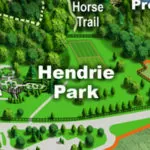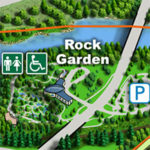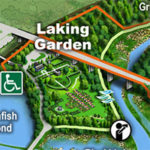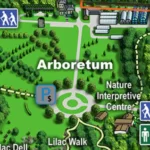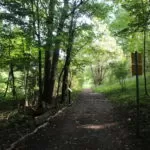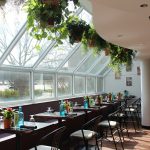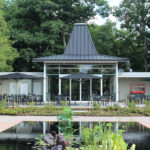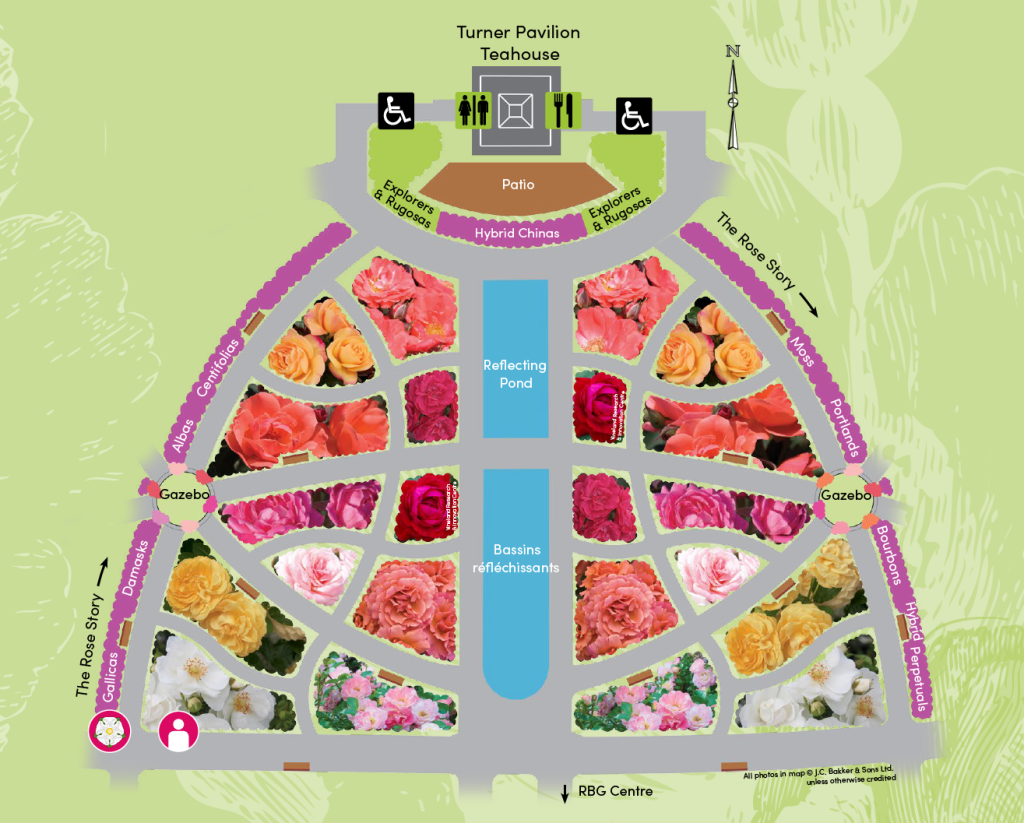| Membership | Price (+HST) |
|---|---|
| Single | $85/year |
| Single Plus | $120/year |
| Family | $130/year |
| Family Plus | $175/year |
| Contributing | $300/year |
| Supporting | $600/year |
| Sustaining | $1,000/year |
| Benefactor's Circle | $2,500/year |
| Director's Circle | $5,000/year |
| President's Circle | $10,000/year |
Rose Garden
RBG’s Rose Collection
Located in Hendrie Park, the rejuvenated rose garden is an innovative, sustainable and inspiring experience, the quintessential rose garden for Canada’s largest botanical garden.
Peak Interest: June to September
Whether for their rich history, folklore, or fragrant beauty, garden roses are loved around the world. Originating from wild species found across Asia, Europe and North America, their cultivation and breeding has evolved along with human society for centuries.
While wandering through this two-acre garden we hope you’ll stop and smell the roses, explore their rich past, and discover how they (like all of us) are changing for a sustainable future.
Bloom Watch
The roses at RBG begin to bloom in early June, and often re-bloom in multiple “flushes” until mid- (or sometimes even late) fall! The roses are complimented by a variety of companion plants with different bloom times, bringing colour to Hendrie Park all season long.
Rose Collection
Current status: Not in bloom.
Plan Your Visit to the Rose Garden
The Rose Garden is located in the heart of Hendrie Park, one of RBG’s four formal garden areas.
Admission
- Garden Admission or Membership Applies
Parking
FREE Parking is available across the street at RBG Centre, 680 Plains Road W.
Getting to Hendrie Park
Enter through the main doors of RBG Centre, where a tunnel is available under Plains Road to Hendrie Park.
- 680 Plains Rd. W. Burlington Ontario
- Bus stops accessed by Burlington Transit
Hendrie Park Hours
Hours reflect garden admission availability at Hendrie Park, and may differ by garden area. Ticketed events and programming may fall outside these hours.
Today’s Hours
Seasonal Hours
- CLOSED to the public, open for RBG members and Teahouse patrons only (Jan 6 to Jan 31)
- 10 a.m. to 5 p.m., time-ticketed during Alice in Bloomland (Feb 1 to Mar 30)
- MEMBERS ONLY 10 a.m. to 5 p.m. (Apr 1 to Apr 6)
- 10 a.m. to 5 p.m. (Apr 7 to May 14)
Exceptions
- Dec 23 10 a.m. to 4 p.m. (final entry 3 p.m.)
- Dec 24 New Years Eve: 10 a.m. to 3 p.m., last admission 2 p.m.
- Dec 25 Christmas Day: Closed
- Dec 26 Boxing Day: Closed
- Dec 30 10 a.m. to 4 p.m. (final entry 3 p.m.)
- Dec 31 New Years Eve: 10 a.m. to 3 p.m., last admission 2 p.m.
- Jan 1 New Year's Day: Closed
Surrounded by Hendrie Park‘s innovative Rose Garden, the newly renovated Tea House offers an ideal spot to relax in nature’s tranquility while enjoying lunch, afternoon tea, or a sweet treat. Enjoy a cup of ‘Royal Blend Tea’, RBG’s own signature blend of rooibos and French florals made in collaboration with Sloane Tea.
Reservations are highly recommended, available online through OpenTable.

The Roses
Despite our best efforts, our past rose collection had languished, due in part to the cosmetic pesticide ban in 2009, and disease-prone cultivars. These left the whole garden vulnerable to detrimental insects, and diseases such as black spot, a fungal disease that has been blamed for a decline in the popularity of rose-growing in recent decades.
To bring new life and vibrancy into the garden required starting from scratch. Using environmentally-friendly treatments couldn’t outweigh the reality that we were growing a large monoculture of disease-prone Hybrid Tea and Floribunda roses in the shadow of large shade trees.
The new rose garden was designed with a sturdy foundation of disease-resistant, disease-tolerant, and cold-hardy roses, including some Canadian introductions you can find at local growers. Surrounding this base of roses are featured companion plants, some of which provide direct allelopathic health benefits to the roses when planted in close proximity. The new garden is hardy, strong, and full of colour throughout the whole growing season.
Historic Roses
Arching around the central display, the outer path’s plants and interpretive panels tell the story of the development of garden roses. Start on the “left” side and move clockwise around the garden to explore garden rose development from the Middle Ages to today.

21st Century Roses
The central display features 21st-century roses selected for their hardiness, disease- and pest-resistance, fragrance and spectacular beauty.
Canadian Shield™
One of the hardy roses featured in the new garden is Canadian Shield™, a low-maintenance, versatile garden and landscape rose that promises plenty of full red flowers and glossy green foliage throughout the growing season. The rose is a repeat bloomer, making it a majestic beauty all season, and just as its name suggests, it’s a hardy flower that can stand up to winter and resist disease from St. John’s, N.L., to Victoria, B.C.
The hugely popular Canadian Shield™ rose is from Vineland’s 49th Parallel Collection, developed at Vineland Research and Innovation Centre (Vineland). Canadian Shield™ is the first rose released in the collection and was named Canada Blooms’ 2017 Plant of the Year.

Companion Plants
The central display also includes annual and perennial companion plants to complement the roses and extend the bloom season while attracting beneficial insects.
Companion plants include Allium, Aster, Butterfly Weed, Beeblossom, Clematis, Daylily, Dill, Lavender, Phlox, Coneflower, Sedum, Verbena bonariensis, Yarrow and more!

A Sustainable Garden for the Future
With a forward-thinking approach, we are responding to the effects of climate change and the expectations of our visitors. We built the Rose Garden, together with beautiful companion plants, as a healthy eco-system garden.
Under these beneficial plant pairings is a trickle irrigation system that allows the roses and their companions to build a deeper root system. Deep roots, combined with leveled mulching, rely on rain instead of regular watering, further building an eco-friendly approach.
This plant pairing and advanced irrigation system is combined with well-planted soil chemistry, creating a garden that is resilient and sustainable. A garden focused on healthy soil working together to attract beneficial insects and ward off the threat of invasive pests. With this thoughtful approach, beauty and sustainability are inter-woven, a holistic approach that builds a healthy ecosystem within the garden – the true hallmark of a 21st century rose garden.
History of the Centennial Rose Garden
A stunning garden for its time, the original Centennial Rose Garden provided over 50 years of memories to generations that walked its pathways.
- 1964: Centennial Rose Garden designed by J. Austin Floyd
- 1965: Construction of Centennial Rose Garden begins
- 1967: Rose Garden opens to the public in recognition of Canada’s Centennial Year
- 1974: Turner Pavilion Tea House opens
- 1975: Twin pergolas designed by Arthur Scott are completed
- 2008: Reflecting ponds open to the public
- 2017: Construction of the new Rose Garden begins
- 2018: Summer – new Rose Garden opens to the public
Despite the best efforts of RBG’s horticulture team, the collection had suffered in recent years. Using environmentally-friendly treatments could not outweigh the reality that the garden was made up of a large monoculture of disease-prone Hybrid teas and Floribunda roses in the shadow of large shade trees.
RBG recognized it was time for a change. In 2017, construction began on the rejuvenated garden, sacrificing a year of roses in order to take the rose garden in a bold new direction.
Learn More about the Rose Garden
Joy in the Rose Garden
By Alex Henderson, Curator of Living Collections, Royal Botanical Gardens.
The Importance of Rose Evaluations
By Alex Henderson, Curator of Living Collections, Royal Botanical Gardens.
Caring for Roses
By Christie Brodie, Interpretation Projects Coordinator, Royal Botanical Gardens.
Video: Rose Garden Evaluations
With Alex Henderson, Curator of Collections
Support Horticulture at RBG
The care and growth of our horticultural collections are possible thanks to the generous support of RBG Members and donors. With a donation to Royal Botanical Gardens, you can ensure an active, vibrant and healthy future for the children of today and tomorrow through our horticultural and conservation projects.
Royal Botanical Gardens (RBG) is the largest botanical garden in Canada, a National Historic Site, and registered charitable organization with a mandate to bring together people, plants and nature.
More to Do, Naturally
Other Major Collections
As a botanical garden, Royal Botanical Gardens acquires, collects, researches, exhibits, conserves and interprets a living horticultural collection.
Bloom Calendar
Plants of interest are ever-changing in RBG’s five cultivated garden areas and nature sanctuaries. Check back to learn what’s blooming now or see the blooms calendar for a rough estimation of what to expect each season.
Events Calendar
Discover what’s happening in the gardens! Some programs, events, and experiences listed below are included in general admission / membership, while others require separate registration.

